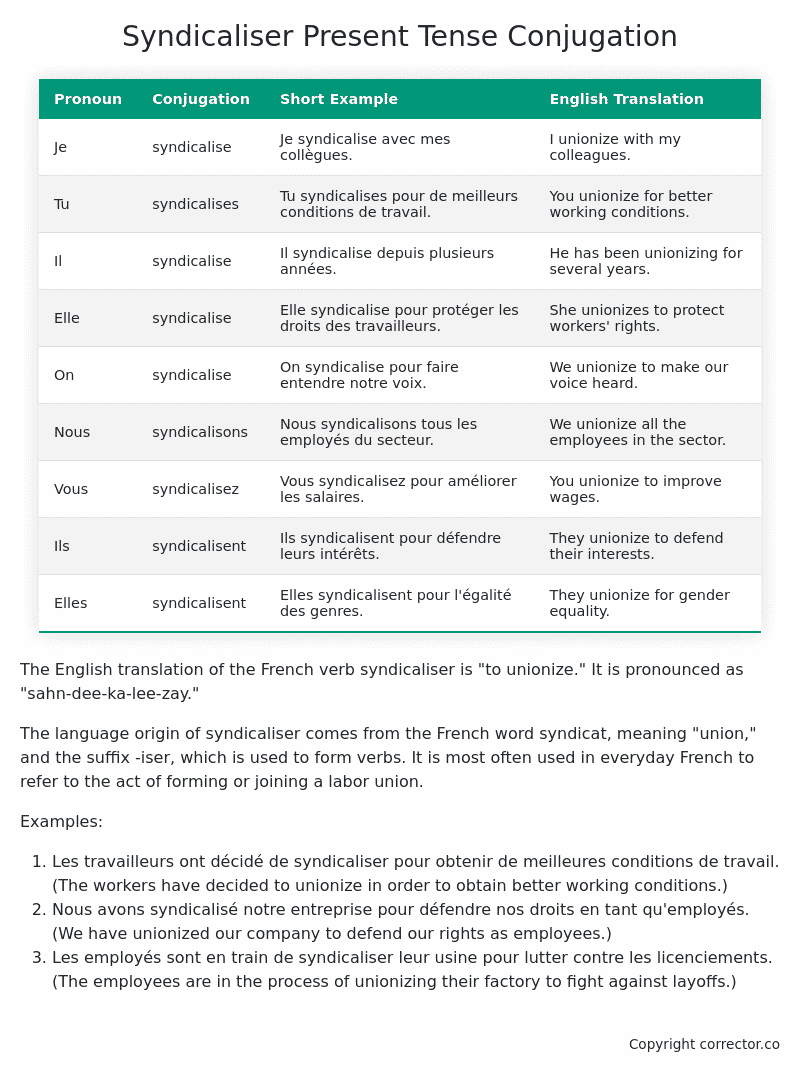Le Present (Present Tense) Conjugation of the French Verb syndicaliser
Introduction to the verb syndicaliser
The English translation of the French verb syndicaliser is “to unionize.” It is pronounced as “sahn-dee-ka-lee-zay.”
The language origin of syndicaliser comes from the French word syndicat, meaning “union,” and the suffix -iser, which is used to form verbs. It is most often used in everyday French to refer to the act of forming or joining a labor union.
Examples:
- Les travailleurs ont décidé de syndicaliser pour obtenir de meilleures conditions de travail. (The workers have decided to unionize in order to obtain better working conditions.)
- Nous avons syndicalisé notre entreprise pour défendre nos droits en tant qu’employés. (We have unionized our company to defend our rights as employees.)
- Les employés sont en train de syndicaliser leur usine pour lutter contre les licenciements. (The employees are in the process of unionizing their factory to fight against layoffs.)
Syndicaliser – About the French Present Tense
To take a deep dive into all the French tenses then see our article on Mastering French Tense Conjugation.
Common Everyday Usage Patterns For Le Present
Interactions with Other Tenses
Table of the Present Tense Conjugation of syndicaliser
| Pronoun | Conjugation | Short Example | English Translation |
|---|---|---|---|
| Je | syndicalise | Je syndicalise avec mes collègues. | I unionize with my colleagues. |
| Tu | syndicalises | Tu syndicalises pour de meilleurs conditions de travail. | You unionize for better working conditions. |
| Il | syndicalise | Il syndicalise depuis plusieurs années. | He has been unionizing for several years. |
| Elle | syndicalise | Elle syndicalise pour protéger les droits des travailleurs. | She unionizes to protect workers’ rights. |
| On | syndicalise | On syndicalise pour faire entendre notre voix. | We unionize to make our voice heard. |
| Nous | syndicalisons | Nous syndicalisons tous les employés du secteur. | We unionize all the employees in the sector. |
| Vous | syndicalisez | Vous syndicalisez pour améliorer les salaires. | You unionize to improve wages. |
| Ils | syndicalisent | Ils syndicalisent pour défendre leurs intérêts. | They unionize to defend their interests. |
| Elles | syndicalisent | Elles syndicalisent pour l’égalité des genres. | They unionize for gender equality. |
Other Conjugations for Syndicaliser.
Le Present (Present Tense) Conjugation of the French Verb syndicaliser (this article)
Imparfait (Imperfect) Tense Conjugation of the French Verb syndicaliser
Passé Simple (Simple Past) Tense Conjugation of the French Verb syndicaliser
Passé Composé (Present Perfect) Tense Conjugation of the French Verb syndicaliser
Futur Simple (Simple Future) Tense Conjugation of the French Verb syndicaliser
Futur Proche (Near Future) Tense Conjugation of the French Verb syndicaliser
Plus-que-parfait (Pluperfect) Tense Conjugation of the French Verb syndicaliser
Passé Antérieur (Past Anterior) Tense Conjugation of the French Verb syndicaliser
Futur Antérieur (Future Anterior) Tense Conjugation of the French Verb syndicaliser
Subjonctif Présent (Subjunctive Present) Tense Conjugation of the French Verb syndicaliser
Subjonctif Passé (Subjunctive Past) Tense Conjugation of the French Verb syndicaliser
Subjonctif Imparfait (Subjunctive Imperfect) Tense Conjugation of the French Verb syndicaliser
Conditionnel Présent (Conditional Present) Tense Conjugation of the French Verb syndicaliser
Conditionnel Passé (Conditional Past) Tense Conjugation of the French Verb syndicaliser
L’impératif Présent (Imperative Present) Tense Conjugation of the French Verb syndicaliser
L’infinitif Présent (Infinitive Present) Tense Conjugation of the French Verb syndicaliser
Struggling with French verbs or the language in general? Why not use our free French Grammar Checker – no registration required!
Get a FREE Download Study Sheet of this Conjugation 🔥
Simply right click the image below, click “save image” and get your free reference for the syndicaliser Present Tense tense conjugation!

I hope you enjoyed this article on the verb syndicaliser. Still in a learning mood? Check out another TOTALLY random French verb present conjugation!


